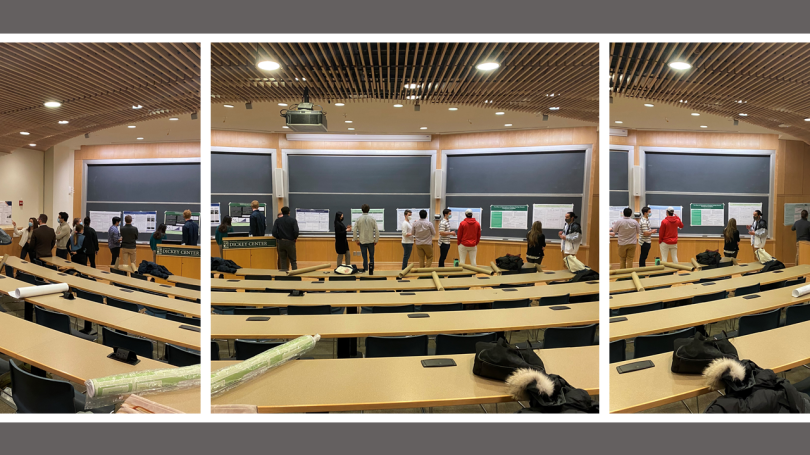
- Undergraduate
- Research
- About the Program
- News & Events
- People
Back to Top Nav
Back to Top Nav
Back to Top Nav
Back to Top Nav
This past March 7 and 8 were poster session days for the students completing one-quarter research projects in the Program in Quantitative Social Science (QSS). In Winter 2022, one-quarter project courses were taught by Visiting Professor Robert Cooper and Lecturer Peter DeWan. Together they supervised 22 research projects.
The QSS one-quarter project poster session provides a venue for the public presentation of capstone research projects executed by graduating QSS students. These projects represent independent research efforts carried out with professorial guidance, and the posters QSS seniors presented in March 2022 summarize, visualize, and communicate the findings of their quantitative research endeavors.
This year, QSS one-quarter research project had subjects ranging from TikTok and the democratization of popular music to the sociodemographic predicators of weight changes during the COVID-19 pandemic.
Here are some representative projects:
Maylene Fahrenthold: demographic mismatch and teacher reports of student misbehavior.
Results - White teachers in majority-minority classes have significantly lower odds of ranking classroom behavior in the well-behaving categories than those who teach in majority white student classrooms.
Chris Jun: competitive debate team rules and the advantages of the affirmative and negative positions in debate order.
Results - debate teams have a slight advantage in the affirmative position, which includes both the first and last speaking positions. High school teams, on the other hand, and especially private high school teams, have advantage in the negative position, which includes the longest interrupted speech of the debate.
Amelia Ockert: individual levels of anxiety in states and state lockdown policies during the COVID-19 pandemic.
Results - individuals have higher levels of anxiety when states enact restrictive lockdown policies and lower levels of anxiety when states enact more supportive COVID-19 policies.
Mike Weir: impact of recreational marijuana legalization in Massachusetts and California
Results - synthetic controls matching method shows a significant reduction is possession arrests in legalizing states (an approximately 30% decrease), but not sales arrests.
Victor Wu: climate cues, credibility-enhancing displays, and co-partisan elite signals about solar energy.
Result - consistent with prior research on the importance of co-partisan elite cues, we find that every treatment significantly increased the likelihood that respondents install solar panels and participate in community solar. For Republicans, climate cues were not less effective than standard cues – despite previous research on motivated reasoning and the polarizing nature of climate change.